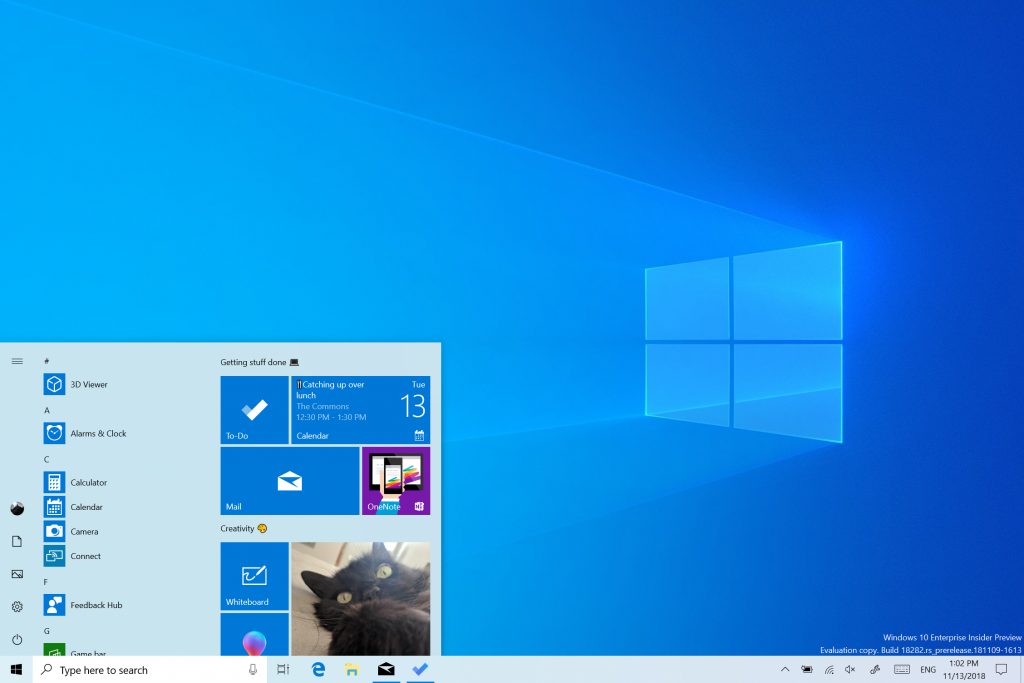Despite Build 2019 Absence, Don't Worry About Windows
At Microsoft’s Build 2019 developer conference here in Seattle, there’s a word I heard far less than many expected: Windows.
Since CEO Satya Nadella took the reigns of Microsoft in 2014, there’s been a big focus on Azure, Microsoft’s cloud computing platform and suite of services, which Nadella worked on before his ascendancy. Funding to the Windows division has been cut, Windows head Terry Myerson left, and a lot of work has been put on Microsoft services on other operating systems, like iOS, macOS and Android.
And at Nadella’s keynote, that was clear. Windows was brought up a few times as part of Microsoft 365, its combination of Office products, enterprise mobility and security, and, of course, Windows 10.
But Windows is still going strong. And one executive hinted at that strength.
Rajesh Jha, executive vice president of the Experiences and Devices group (which encompasses Office 365, which he previously headed up), made a joke about it when he hosted the Microsoft 365 technical keynote at Build.
“If you’re all here to learn about Windows and Office, you’re still in the right place,” Jha joked just half an hour following Nadella’s keynote, which barely mentioned either.
Then he spouted the big number: one billion people using Windows.
Get Tom's Hardware's best news and in-depth reviews, straight to your inbox.
That’s individuals, businesses and education. And they’re not all jumping ship at once. Windows may not be the focus of the company anymore (Microsoft missed the chance to move it to mobile phones. It knows it), but it’s a hugely profitable business for Microsoft.
In a recent profile of Microsoft under Nadella, Bloomberg Businessweek pegged Windows as being a $20 billion-per-year business. In its Q3 Fiscal Year 2019 earnings report in April, the revenue from MIcrosoft’s “More Personal Computing” group, was $10.7 billion. Some of that included Windows OEM revenue (up 9 percent), Windows commercial products and cloud services (up 18 percent) and Surface revenue (up 21 percent) -- all devices or services that depend on Windows 10.
And interoperability is hugely important. Android and iOS owners still use Windows and Office, so it makes sense to focus on it (and, of course, those devices are selling like hotcakes. Some people's first machines run Android, not Windows). It also makes sense to put the spotlight on Azure, the burgeoning new star on Microsoft’s Redmond campus and beyond. And surely, Microsoft would rather not just have developers do work on Windows 10, but also Azure, the Microsoft Graph and Office.
Much of the immediate future of Windows 10 - the imminent May 2019 update - has already been revealed in the form of Insider builds. Builds of 19H2 and 20H1 are still forthcoming, even in some Insider Builds.
So at Build 2019, Microsoft focused elsewhere. It’s weird for the company to be so quiet about its operating system with a billion users, but developers and users don’t have to worry about its disappearance.
Note: As with all of our op-eds, the opinions expressed here belong to the writer alone and not Tom's Hardware as a team.

Andrew E. Freedman is a senior editor at Tom's Hardware focusing on laptops, desktops and gaming. He also keeps up with the latest news. A lover of all things gaming and tech, his previous work has shown up in Tom's Guide, Laptop Mag, Kotaku, PCMag and Complex, among others. Follow him on Threads @FreedmanAE and BlueSky @andrewfreedman.net. You can send him tips on Signal: andrewfreedman.01
-
thegriff I am still ticked off that they got rid of Windows phone/support for Win 10 on ones still out their. I wanted to stay away from iPhones (partly due to not allowing memory cards, so limited storage on phone), and the google store to get anything (I refuse to sign up for anything google). So, windows was perfect and synced with my computer, was relatively easy to use, but was limited in apps. But, I think in the US the cell companies screwed them also, because on Verizon I could never find their best phones only the lower tier ones and they were limited on other companies also. Now they are messing with Windows (I still have 7), with this cloud crap. Ahhh, Linux may start looking good.Reply -
Jagwired If Nadella had his way, Microsoft wouldn't make hardware (Surface or Xbox) or Windows. The margins are higher on cloud services and apps. He wants to compete with Oracle and IBM, not Google and Apple.Reply -
owen420_30 Replythegriff said:I am still ticked off that they got rid of Windows phone/support for Win 10 on ones still out their. I wanted to stay away from iPhones (partly due to not allowing memory cards, so limited storage on phone), and the google store to get anything (I refuse to sign up for anything google). So, windows was perfect and synced with my computer, was relatively easy to use, but was limited in apps. But, I think in the US the cell companies screwed them also, because on Verizon I could never find their best phones only the lower tier ones and they were limited on other companies also. Now they are messing with Windows (I still have 7), with this cloud crap. Ahhh, Linux may start looking good.
yes because your living in the past....
windows phone is dead
windows 7 is dead
stop using hardware from 10 years ago and expect support
microsoft has moved onto apps/support for android, they know windows phone was never going anywhere the world either runs on iOS or Android when it comes to smart phones. -
g-unit1111 Replythegriff said:I am still ticked off that they got rid of Windows phone/support for Win 10 on ones still out their. I wanted to stay away from iPhones (partly due to not allowing memory cards, so limited storage on phone), and the google store to get anything (I refuse to sign up for anything google). So, windows was perfect and synced with my computer, was relatively easy to use, but was limited in apps. But, I think in the US the cell companies screwed them also, because on Verizon I could never find their best phones only the lower tier ones and they were limited on other companies also. Now they are messing with Windows (I still have 7), with this cloud crap. Ahhh, Linux may start looking good.
I never understood the appeal of having cell phone apps and an app store on a desktop PC in the first place. Cell phone apps are made for touch screens and they look ridiculously out of place on a desktop and laptop. I do get the appeal of being able to make calls from your PC, but the apps and app store can go as far as I'm concerned. -
g-unit1111 Replyowen420_30 said:yes because your living in the past....
windows phone is dead
windows 7 is dead
stop using hardware from 10 years ago and expect support
microsoft has moved onto apps/support for android, they know windows phone was never going anywhere the world either runs on iOS or Android when it comes to smart phones.
Windows Phone was a great operating system at the time, it is a shame that it got no support. Microsoft had a Windows phone that came out back I want to say in 2013 that actually had some solid specs for that time but it was a shame that no carriers wanted to use or promote it.

